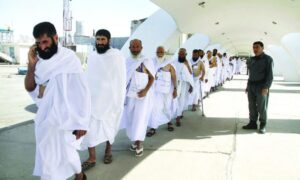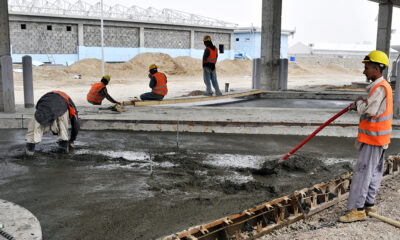Regional
Hundreds die of extreme heat on haj pilgrimage, reports say
Saudi state TV said temperatures rose on Monday as high as 51.8 degrees Celsius (125.2 Fahrenheit) in the shade at the Grand Mosque in Mecca.
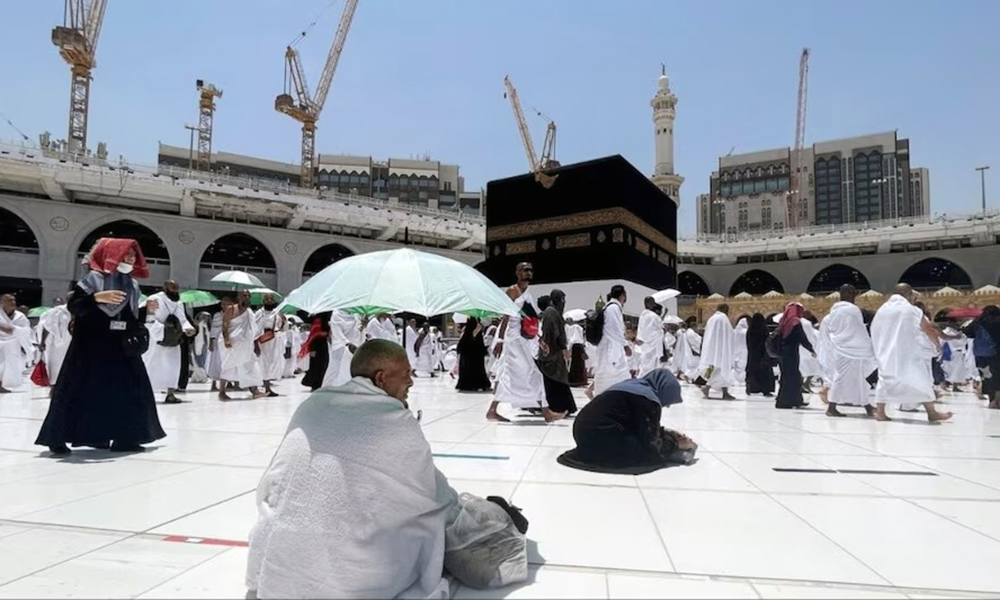
Hundreds of visitors have died during the annual Muslim pilgrimage to Mecca amid scorching heat, according to press reports and foreign ministries.
At least 550 people have died on haj, diplomats told French outlet Agence France Presse (AFP) on Tuesday. Three hundred and twenty-three of the dead were Egyptians, most of whom perished due to heat-related illness, AFP reported, citing two Arab diplomats.
Reuters was not able to immediately verify those numbers.
Stampedes, tent fires and other accidents have caused hundreds of deaths during haj to Saudi Arabia in the past 30 years. The pilgrimage began on Friday.
Saudi state TV said temperatures rose on Monday as high as 51.8 degrees Celsius (125.2 Fahrenheit) in the shade at the Grand Mosque in Mecca.
A 2024 study by the Journal of Travel and Medicine found that rising global temperatures may outpace strategies to deal with the heat. A 2019 study by Geophysical Research Letters said that as temperatures rise in arid Saudi Arabia due to climate change, pilgrims performing haj will face “extreme danger”.
Thirty-five Tunisian citizens have died during the haj, Tunisian news agency Tunis Afrique Presse said on Tuesday.
Many of those deaths were due to extreme heat, family members said on social media, as other families continued to search for missing relatives in Saudi hospitals, Reuters reported.
The Jordanian foreign ministry said it had issued 41 burial permits for Jordanian pilgrims on Tuesday. Earlier, the ministry said at least six Jordanian citizens died of heat stroke during the haj.
Eleven Iranians have died and 24 were hospitalized during the pilgrimage, Iranian state news outlet IRINN said on Tuesday without giving the causes of death.
Three Senegalese citizens also died during haj, Agence de Presse Sénégalaise, said on Monday.
One hundred and forty-four Indonesian citizens died during the pilgrimage, Indonesian health ministry data showed on Tuesday. The data did not specify if any of the deaths were due to heat stroke.
PHYSICAL EXERTION
The haj is an annual pilgrimage that millions of Muslims make to Mecca to perform religious rites as taught by the Prophet Mohammad to his followers 14 centuries ago.
A Saudi health official, speaking to Reuters on Monday, before many of the reports of deaths were issued, said that authorities had not noticed any unusual fatalities among Muslim pilgrims amid the extremely high temperatures.
The ministry had so far treated more than 2,700 pilgrims who suffered from heat-related illness, he added.
“Haj is a difficult task, so you have to exert efforts and perform the rituals even in the conditions of heat and crowding,” an Egyptian pilgrim told Reuters on Sunday.
Pilgrims used umbrellas to protect themselves from the sun, as Saudi authorities warned pilgrims to stay hydrated and avoid being outdoors during the hottest hours between 11 a.m. (0800 GMT) and 3 p.m.
Haj, one of the largest mass gatherings in the world, is a once-in-a-lifetime duty for able-bodied Muslims who can afford it. It will end on Wednesday, read the report.
More than 1.8 million pilgrims were expected to take part this year, according to the Saudi General Authority for Statistics.
Related Stories:
Fourteen Jordanians die during hajj in Saudi Arabia, some succumb to heat
Regional
Lavrov in Uzbekistan for talks on various issues including regional security matters
Lavrov is expected to meet with Uzbek President Shavkat Mirziyoyev and with Uzbek Foreign Minister Bakhtiyor Saidov
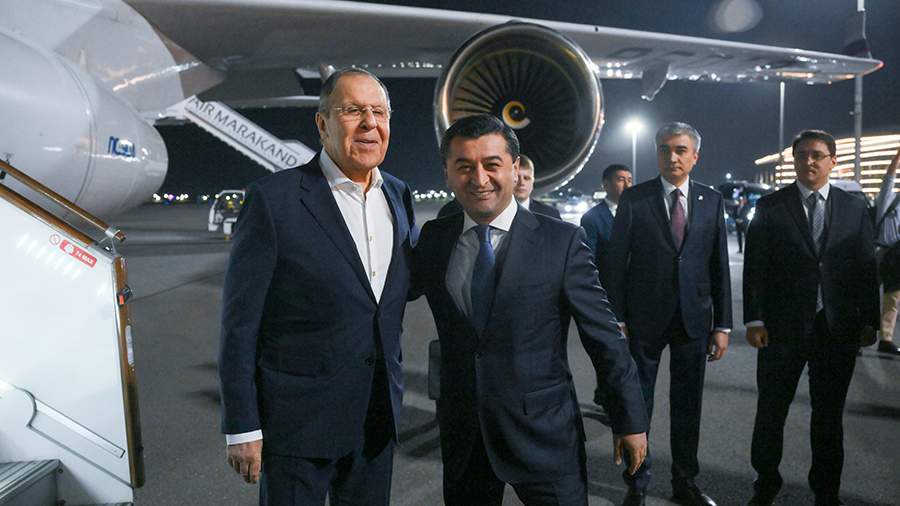
Russian Foreign Minister Sergey Lavrov will meet with Uzbek government officials this week to discuss bilateral relations, Eurasian integration and preparations for the upcoming 80th anniversary of victory over Nazi Germany.
The Russian Foreign Ministry’s official spokeswoman, Maria Zakharova, said Lavrov is expected to meet with Uzbek President Shavkat Mirziyoyev and will hold talks with Uzbek Foreign Minister Bakhtiyor Saidov, TASS reported.
“The sides will discuss current international issues of mutual interest, regional security matters, cooperation within the CIS, SCO and Central Asia-Russia frameworks, taking into account the closeness or similarity between Moscow and Tashkent’s approaches,” Zakharova said adding that “the agenda will also include matters of Eurasian integration processes with Uzbekistan’s observer status in the EAEU in mind.”
During his meetings with leaders of the Commonwealth of Independent States (CIS) last December, Russian President Vladimir Putin invited them to attend the Victory Day celebrations in Moscow scheduled to be held on May 9.
Also, military units from 19 friendly nations have been invited to participate in the Red Square Parade. The list of these countries has not yet been published, but Uzbek troops marched in the Red Square five years ago, during the 75th anniversary of Victory in the Great Patriotic War.
Uzbekistan traditionally holds numerous Victory Day celebrations and campaigns.
Meanwhile, the Russian Foreign Ministry has emphasized that Moscow and Tashkent have “constructive, respectful and mutually beneficial ties, based on the principles of friendship, sovereign equality and respect to each other’s interests.”
The sides actively cooperate in trade, energy, science and humanitarian affairs.
Special attention will be paid to the issue of labor migrants, as around 1.1 million Uzbek citizens are employed in various sectors in Russia.
Talks will also reportedly include Afghanistan, as this is an important subject for the two nations, TASS reported.
Other regional and global issues are also expected to be touched upon during Lavrov’s meetings with Uzbek officials in Samarkand.
Regional
At least 20 feared killed in militant attack on tourists in Indian Kashmir, security sources say
One security source put the death toll at 20; the second put it at 24 and the third at 26. All three spoke on condition of anonymity as they were not authorised to speak to the media.
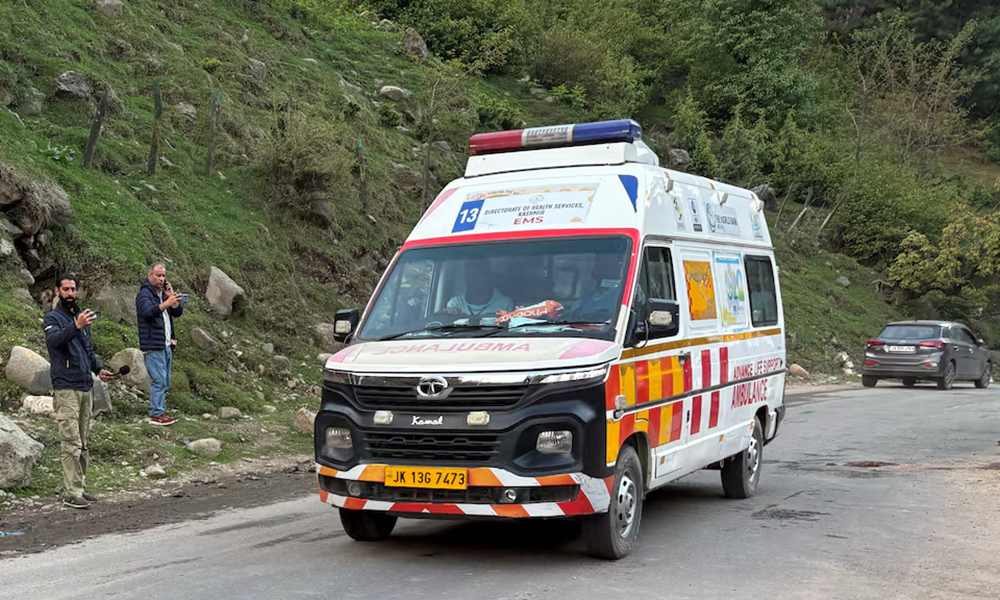
At least 20 people were feared killed after suspected militants opened fire on tourists in India’s Jammu and Kashmir territory on Tuesday, three security sources said, the worst attack on civilians in the troubled Himalayan region for years, Reuters reported.
The attack occurred in Pahalgam, a popular destination in the scenic, mountainous region where mass tourism, especially during the summer, has resurged as Islamist militant violence has eased in recent years.
One security source put the death toll at 20; the second put it at 24 and the third at 26. All three spoke on condition of anonymity as they were not authorised to speak to the media.
“The firing happened in front of us,” one witness told broadcaster India Today, without giving his name. “We thought someone was setting off firecrackers, but when we heard other people (screaming), we quickly got out of there … saved our lives and ran.”
“For four kilometers, we did not stop … I am shaking,” another witness told India Today.
The attack occurred in an off-the-road meadow and two or three militants were involved, the Indian Express newspaper reported, citing an unidentified senior police officer.
“The death toll is still being ascertained so I don’t want to get into those details,” Jammu and Kashmir Chief Minister Omar Abdullah said in a post on X. “Needless to say, this attack is much larger than anything we’ve seen directed at civilians in recent years.”
The nationalities of the victims were not immediately known, read the report.
A little-known militant group, the “Kashmir Resistance,” claimed responsibility for the attack in a social media message. It expressed discontent that more than 85,000 “outsiders” had been settled in the region, spurring a “demographic change”.
“Consequently, violence will be directed toward those attempting to settle illegally,” it said.
Reuters could not independently verify the source of the message.
The regional government of Jammu and Kashmir, where Pahalgam is located, told its legislature this month that nearly 84,000 non-locals, from within India, had been given domicile rights in the territory in the last two years.
“Those behind this heinous act will be brought to justice … They will not be spared!” Indian Prime Minister Narendra Modi posted on X. “Their evil agenda will never succeed. Our resolve to fight terrorism is unshakable and it will get even stronger.”
Indian Home Minister Amit Shah said he was rushing to Kashmir to hold a security meeting.
In Washington, the White House said U.S. President Donald Trump had been briefed on what a White House spokesperson described as a “brutal terrorist attack.”
India’s foreign ministry subsequently said Trump called Modi and “expressed full support to India to bring to justice the perpetrators of this heinous attack.”
Militant violence has afflicted the Himalayan region, claimed in full but ruled in part by both India and Pakistan, since an anti-Indian insurgency began in 1989. Tens of thousands of people have been killed, although violence has tapered off in recent years, Reuters reported.
India revoked Kashmir’s special status in 2019, splitting the state into two federally administered territories – Jammu and Kashmir, and Ladakh. The move allowed local authorities to issue domicile rights to outsiders, allowing them to get jobs and buy land in the territory.
That led to a deterioration of ties with Pakistan, which also claims the region. The dispute has spurred bitter animosity and military conflict between the nuclear-armed neighbours.
Attacks targeting tourists in Kashmir have become rare. The last deadly incident took place in June 2024 when at least nine people were killed and 33 injured after a militant attack caused a bus carrying Hindu pilgrims to plunge into a deep gorge.
Some major militant attacks during the height of the insurgency coincided with visits from high-profile foreign officials to India, in likely attempts to draw global attention to Kashmir, Indian security agencies have said.
Tuesday’s attack came a day after U.S. Vice President JD Vance began a four-day, largely personal visit to India.
Regional
Iran’s top diplomat to visit China on Tuesday
In a trip to Moscow last week, Araqchi told state TV that Tehran always closely consults with its friends, Russia and China, over the nuclear issue.
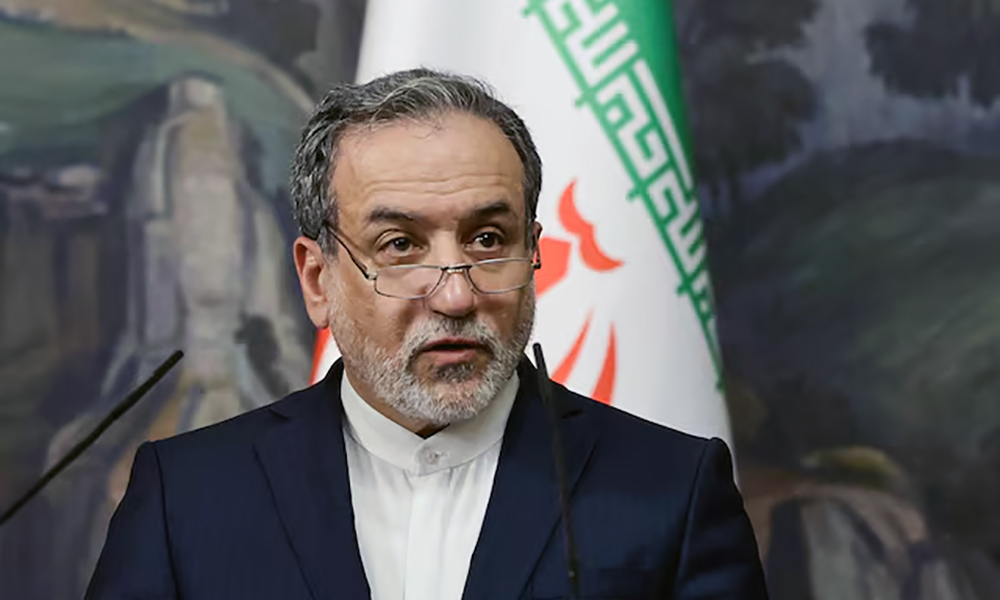
Iran’s Foreign Minister Abbas Araqchi will visit China on Tuesday, foreign ministry spokesperson Esmaeil Baghaei said on Monday, ahead of a third round of nuclear talks between Tehran and Washington due on Saturday in Oman.
In a trip to Moscow last week, Araqchi told state TV that Tehran always closely consults with its friends, Russia and China, over the nuclear issue.
“It is natural that we will consult and brief China over the latest developments in Iran-U.S. indirect talks,” Baghaei said, adding that Beijing can play a constructive role in this process.
Long-time foes Iran and the U.S. started negotiations earlier this month with the aim of placing limits on Tehran’s nuclear programme, which Western powers say is geared toward developing nuclear weapons.
Tehran has long denied such accusations and seeks in exchange the lifting of U.S. sanctions that were re-imposed by President Donald Trump during his first term in office (2017-2021), when he withdrew from a 2015 nuclear pact between Iran and world powers, including China and Russia.
Since taking office in January, Trump has ratcheted pressure on Iran and has for the first time sanctioned Chinese “teapot” refineries – small, independent plants – that process Iranian crude oil and have provided an economic lifeline to Tehran’s squeezed economy.
“The policy of maximum pressure is not just against Iran but also other countries and goes against freedom of trade. In the case of China, sanctions also seek to disrupt south-south cooperation,” Baghaei said.
Beijing accounted for at least 77% of Iran’s roughly 1.6 million bpd of exported crude in 2024, according to analytics firm Kpler. The value of Iran’s crude sales to China is not officially disclosed, but a Reuters calculation puts the trade at nearly $29 billion last year, assuming a 20% discount to Brent crude prices to include the cost of logistics.
“China and Iran have maintained exchanges and contacts at all levels and in various fields. With regard to the specific visit mentioned, I have no information to offer at the moment,” Chinese Foreign Ministry spokesperson Guo Jiakun said on Monday regarding Araqchi’s upcoming visit.
-

 Sport4 days ago
Sport4 days agoAfghanistan qualify for U19 Cricket World Cup 2026
-
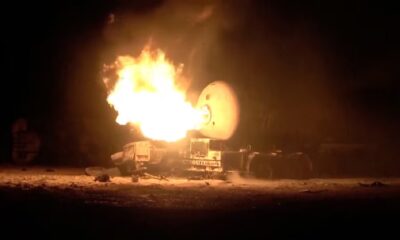
 Regional5 days ago
Regional5 days agoDeadliest US strike in Yemen kills 74 at oil terminal, Houthis say
-

 World4 days ago
World4 days agoThousands of protesters rally against Trump across US
-

 World4 days ago
World4 days agoIran, US end nuclear talks in Rome, agree to meet next week
-

 Latest News4 days ago
Latest News4 days agoPolio vaccination campaign launched in Afghanistan
-

 International Sports4 days ago
International Sports4 days agoIPL 2025: 14-year-old Vaibhav Suryavanshi becomes youngest IPL player
-

 Latest News2 days ago
Latest News2 days agoChina invites various Afghan delegations to attend Shanghai forums
-

 International Sports2 days ago
International Sports2 days agoIPL 2025: Robo-Dog ‘Champak’ explained


